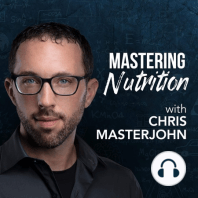35 min listen

Bovine colostrum for those with dairy sensitivities, and what to do about food sensitivities in general | Masterjohn Q&A Files #12
Bovine colostrum for those with dairy sensitivities, and what to do about food sensitivities in general | Masterjohn Q&A Files #12
ratings:
Length:
9 minutes
Released:
Nov 25, 2019
Format:
Podcast episode
Description
Question, part 1: "Bovine colostrum from New Zealand cows. Yea or nay for those with dairy sensitivities? If nay, what would you recommend instead?" What is your goal? If you have a dairy sensitivity, your problem could be with casein, with the whey proteins, or with something more specific like certain antibodies. It's very complicated. You're less likely to tolerate colostrum if you have a known dairy sensitivity, but you can't really know without testing the colostrum. Question, part 2: "to settle a client's overactive immune system down." What, specifically, about the overactive immune system are we looking at? I would think maybe this is chronic inflammation that's not resolving, and then I'm thinking more about arachidonic acid and DHA. Question, part 3: "She can take a supplement one time and then the next time it throws her over. Same with food." Okay, that sounds to me like an oral tolerance issue. When you put something in your mouth, it goes to your gut, and then your immune system decides whether it's safe or whether it's not safe. Your immune system doesn't know anything when you're born; it is more or less a blank slate. You do have predispositions because you have genetics that impact categories of protein fragments that you have the potential to make a decision about, but you are never born having a tolerance or intolerance to something. You are born with very broad genetics that say, “I will make decisions about this category, I can't recognize this category, I will make decisions about this category.” So, you eat food or take supplements, you put something in your mouth, you swallow it. In your gut, your immune system says, “This might be something important, I'm going to take it back to my home base and decide what to do about it.” That home base is called the gut-associated lymphoid tissue, or GALT. Your immune system is deliberately taking things into that lymph tissue, purposefully taking fragments that are not completely digested for the purpose of making decisions about it. In the gut, how does it make that decision? Overwhelmingly, there are two pro-tolerance factors. They are prostaglandin E2, which is made from arachidonic acid, the omega-6 fatty acid that's found most abundantly in egg yolks and liver, and that is the direct target of anti-inflammatory drugs, acetaminophen (Tylenol), aspirin, high doses of EPA from fish oil, and probably a lot of herbal anti-inflammatories. They will lower prostaglandin E2, and prostaglandin E2 is critical for oral tolerance in the gut. So, any potential anti-inflammatory is a potential contributor to this. You need prostaglandin E2, made from COX-2 from arachidonic acid, made from everything that everyone believes is inflammatory. All the anti-inflammatory drugs, the Zone diet, almost everything written about inflammation says prostaglandin E2 is inflammatory. It is one of the two central causes of oral tolerance, of the immune system recognizing that something is safe. The other is retinoic acid made from vitamin A. So, to create a pro-tolerance environment, you want no COX inhibitors being taken, you want sufficient arachidonic acid in the diet, and you want sufficient vitamin A in the diet. Then what are the factors that tell the immune system, this is not safe, and that is tissue damage. So, the immune system is basically saying, "I will make a decision about this. To make this decision, I need data." So, what are the data that things are okay? Retinoic acid, prostaglandin E2. What are the data that say this is not okay? All the factors released during tissue damage because tissue damage is the number one sign that something is harmful. So, if the thing comes in and they're fine, then the next time they take it, they don't tolerate it. That sounds like they are programmed to decide that everything that comes in is a threat. And so they take it, and it gets into their system and it doesn't do anything, but meanwhile the immune system took a
Released:
Nov 25, 2019
Format:
Podcast episode
Titles in the series (100)
006: Why "Glycation" Is a Bad Reason to Restrict Carbs: In this episode, I respond to a listener's question aboutwhether glycation is a good argument against a high-carbohydratediet. I agree that we should avoid refined carbs and emptycalories, but in this episode I describe why "glycation" is reallya... by Mastering Nutrition